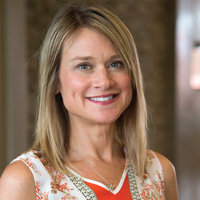
WGHI Investor: Susan Butler (BSIM '65, HDR '99) contributed $500,000 to the new Women's Global Health Institute. (Photo by Mark Simons)
The most recent chapter of this story begins last year, as Susan Butler (BSIM '65, HDR '99), noted Purdue alumna and former trustee, and current CEO of the Susan Bulkeley Butler Institute for the Development of Women Leaders, arranges a meeting with Connie Weaver, head and Distinguished Professor of Nutrition Science. The two get to talking, and Butler reveals the intent of her visit: "It's come to my attention that there's not nearly enough existing research that focuses specifically on women's health."
Without missing a beat, Weaver responds: "No, and it's time we do something about it."
From this meeting of the minds, an initiative begins to take shape on Purdue's West Lafayette campus: the establishment of the Women's Global Health Institute (WGHI), a comprehensive and collaborative partnership that would set out to improve the health of women worldwide through integrated research and training.
Purdue's Emerging Role
The seeds of today's WGHI were first planted in 1991, when an organization with a similar acronym — the Women's Health Initiative (WHI) — was established by the National Institutes of Health. WHI researched the most common causes of death, disability and impaired quality of life in post-menopausal women — ailments that included cardiovascular disease, cancer and osteoporosis. WHI stood as one of the largest prevention studies of its kind ever undertaken, spanning a full 15 years and investing many millions of dollars in researching female-specific health problems and their cures.
Previous to WHI, Weaver says, "The prevailing attitude was that women shouldn't be included in high-stakes health research because it was believed that fluctuating hormones like estrogen would skew the findings. So decades and decades passed, and while medical breakthroughs proliferated, they applied directly to men and perhaps only indirectly, if at all, to women."
And though the WHI represented a sea change in reversing this prevailing assumption, Weaver says, "One study, no matter how groundbreaking, simply can't make up for decades of neglect."
But the rules of the game have changed, she says. "Now grant writers who propose only studying men have to justify why. So we're evening the playing field, but women's health issues still lag behind."
The more Weaver and Butler studied the issues, understanding the stakes at hand, the more they realized the solution was right under their noses. Indiana has a very high incidence of chronic disease in women, meaning local subjects were not only plentiful, but in great need. And Purdue already possessed several crucial components that any new health initiative would require: the extensive infrastructure needed to study disease prevention and biomedical technology development; an established network for community engagement and global health research; and Discovery Park, the innovation lab that houses Bindley Bioscience Center and Birck Nanotechnology Center.
For Weaver, it was a fortuitous convergence. "I took a closer look at the research already unfolding at Purdue, and realized much of it already focuses on preventing women's cancer — researchers are performing game-changing work on epigenetics and the health of cells and understanding how healthy cells transform into abnormal cells."
From there, Weaver considered the amazing technology base on campus, the abundant resources present at Discovery Park and how the College of Health and Human Sciences had recently been created to address these very types of issues. "We were already asking the questions and employing high-tech resources and methods to find the answers," she says. "That's the moment it all clicked, and I truly believed that we really could build a center devoted to women's health."
A 2008 grant to form the Indiana Clinical and Translational Sciences Institute laid the infrastructural groundwork, and on March 23, 2012, WGHI began with a vision to "change the way women's health throughout the life span is addressed. Rather than the classical medical model of treating people with established disease, the center will seek proactive approaches. The center will focus on protecting and improving women's health and well-being through prevention."
The idea of adopting proactive measures resonates clearly with Weaver. "Nutrition science is all about wellness and prevention," she says, "so this was a natural extension for me. My research has centered around prevention — building strong bones in kids, pinpointing the type of diet that helps people avoid osteoporosis later in life." With the new institute, Weaver's focus expands, but her emphasis on preventive care remains steadfast.











